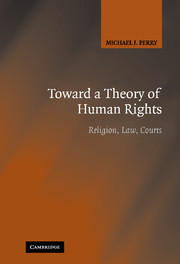Book contents
- Frontmatter
- Contents
- Acknowledgments
- Introduction
- TOWARD A THEORY OF HUMAN RIGHTS
- PART ONE THE MORALITY OF HUMAN RIGHTS
- 1 The Morality of Human Rights
- 2 The Morality of Human Rights: A Religious Ground
- 3 The Morality of Human Rights: A Non-Religious Ground?
- PART TWO FROM MORALITY TO LAW
- PART THREE FROM LAW TO COURTS
- Summation
- Notes
- Index
2 - The Morality of Human Rights: A Religious Ground
Published online by Cambridge University Press: 22 July 2009
- Frontmatter
- Contents
- Acknowledgments
- Introduction
- TOWARD A THEORY OF HUMAN RIGHTS
- PART ONE THE MORALITY OF HUMAN RIGHTS
- 1 The Morality of Human Rights
- 2 The Morality of Human Rights: A Religious Ground
- 3 The Morality of Human Rights: A Non-Religious Ground?
- PART TWO FROM MORALITY TO LAW
- PART THREE FROM LAW TO COURTS
- Summation
- Notes
- Index
Summary
Only someone who is religious can speak seriously of the sacred, but such talk informs the thoughts of most of us whether or not we are religious, for it shapes our thoughts about the way in which human beings limit our will as does nothing else in nature. If we are not religious, we will often search for one of the inadequate expressions which are available to us to say what we hope will be a secular equivalent of it. We may say that all human beings are inestimably precious, that they are ends in themselves, that they are owed unconditional respect, that they possess inalienable rights, and, of course, that they possess inalienable dignity. In my judgment these are ways of trying to say what we feel a need to say when we are estranged from the conceptual resources we need to say it. Be that as it may: each of them is problematic and contentious. Not one of them has the simple power of the religious ways of speaking.
Where does that power come from. Not, I am quite sure, from esoteric theological or philosophical elaborations of what it means for something to be sacred. It derives from the unashamedly anthropomorphic character of the claim that we are sacred because God loves us, his children.
Raimond GaitaAs I explained in Chapter 1, the fundamental, twofold conviction at the heart of the morality of human rights holds that each and every (born) human being – each and every member of the species homo sapiens sapiens – has inherent dignity and is inviolable: not-to-be-violated.
- Type
- Chapter
- Information
- Toward a Theory of Human RightsReligion, Law, Courts, pp. 7 - 13Publisher: Cambridge University PressPrint publication year: 2006



